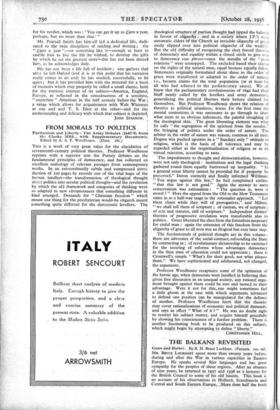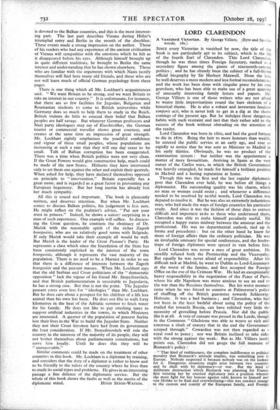THE BALKANS REVISITED
Guns and Butter. By R. H. Bruce Lockhart. (Putnam. nos. 6d. MR. BRUCE LOCKHART spent more than twenty years before, during and after the War in various capacities in Eastern Europe. He speaks several Slav languages and has great sympathy for the peoples of these regions. After an absence of nine years, he returned in 1937 and 1938 •as a lecturer for the British Council to some of his old haunts. This book is an account of his observations in Holland, Scandinavia and Central and South F,a,stern Europe, More than half the book is devoted to the Balkan countries, and this is the most interest- ing part. The last part describes Vienna during Hitler's triumphal entry and Berlin in the month of the Anschluss. These events made a strong impression on the author. Those of his readers who had any experience of the ancient civilisation• of Vienna will sympathise with the emotions which he felt as it disappeared before his eyes. Although himself brought up in quite different traditions, he brought to Berlin the same interest and understanding that he has shown elsewhere. Those who are familiar with the arguments with which Nazis justify themselves will find here many old friends, and those who are not will learn much of official German psychology from these pages.
There is one thing which all Mr. Lockhart's acquaintances said. " We want Britain to be strong, and we want Britain to take an interest in our country." It is unfortunate, for instance, that there are so few facilities for Jugoslav, Bulgarian and Roumanian students to • come to British universities while Germany does so much to help them to study in the Reich. British visitors do little to conceal. their belief that Balkan peoples are half savage. But whatever German professors and Nazi party ideologues may say of Knechtvolker, the German tourist or commercial traveller shows great courtesy, and creates at the same time an impression of great strength. Mr. Lockhart rightly 'emphasises the youthful confidence and vigour of these small peoples, whose populations are increasing at such a rate that they will one day cease to be small. Talk of Balkan corruption has been exaggerated. There was a time when British politics were not very clean. If the Great Powers would give constructive help, much could be made of the new States. Hitherto they have intervened only to set them one against the other and exploit their quarrels. When asked for help, they have declared themselves opposed on principle to " intervention." Britain especially has a great name, and is regarded as a great factor in preventing any European hegemony. But her long inertia has already lost her much sympathy.
All this is sound and important. The book is pleasantly written, and deserves attention. But when Mr. Lockhart comes to discuss Balkan politics, his judgement is less sure. He might reflect on the psalmist's advice, " Put not your trust in princes." Indeed, he shows a naivety surprising in a man of such experience. One example will suffice. In discuss- ing the Croat question, he contrasts the obstinacy of Dr. Maek with the reasonable spirit cf the richer Zagreb bourgeoisie, who are on relatively good terms with Belgrade. If only Maek would take their example all would be well. But Maek is the leader of the Croat Peasant's Party. He represents a class which since the foundation of the State has been consistently 'exploited in the interest of The town bourgeoisie, although it represents the vast majority of the population. There is no need to be a Marxist in order to see that there is a difference of interests between the Zagreb bourgeoisie and the peasant masses. When Mr. Lockhart says that the old Serbian and Croat politicians of the " democratic opposition " lack the vigour of his friend Mr. Stoyadinovitch, and that British parliamentarism is unsuitable to Jugoslavia, he has a strong case. But that is not the point. The Jugoslav peasant cares even less for " ideologies " than Mr. Lockhart. But he does care about a prospect for his children of a life less animal than his own has been. He does not like to walk forty kilometres in the heat of the Adriatic summer to fetch water
for his family. He 'does not like to pay crushing taxes to support artificial industries in the towns, in which Ministers are interested. A quarter of the population of peasant Serbia lost their lives in.the War to build the Jugoslav State. Neither they nor their Croat kinsmen have had from- its government the least consideration. If Mr. Stoyadinovitch will rule the country in the interests of the majority of its people, they will not bother themselves about parliamentary constitutions, but serve him loyally. Until he does this they will be " unreasonable."
Similar comments could be made on the treatment of other countries in this book. Mr. Lockhart is a diplomat by training, and considers that the duty of a diplomat is rather to know and to be friendly to the rulers of the country where he lives than to study its social types and problems. He gives in an interesting paisage a fine defence of the diplomatic service. the whole of this book shows the faults as well as the merits of the

























































 Previous page
Previous page